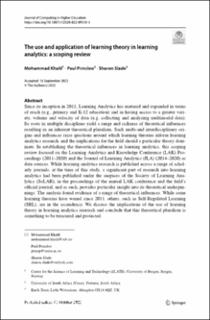| dc.contributor.author | Khalil, Mohammad | |
| dc.contributor.author | Prinsloo, Paul | |
| dc.contributor.author | Slade, Sharon | |
| dc.date.accessioned | 2023-03-03T09:37:55Z | |
| dc.date.available | 2023-03-03T09:37:55Z | |
| dc.date.created | 2022-11-19T12:04:53Z | |
| dc.date.issued | 2022 | |
| dc.identifier.issn | 1042-1726 | |
| dc.identifier.uri | https://hdl.handle.net/11250/3055680 | |
| dc.description.abstract | Since its inception in 2011, Learning Analytics has matured and expanded in terms of reach (e.g., primary and K-12 education) and in having access to a greater variety, volume and velocity of data (e.g. collecting and analyzing multimodal data). Its roots in multiple disciplines yield a range and richness of theoretical influences resulting in an inherent theoretical pluralism. Such multi-and interdisciplinary origins and influences raise questions around which learning theories inform learning analytics research, and the implications for the field should a particular theory dominate. In establishing the theoretical influences in learning analytics, this scoping review focused on the Learning Analytics and Knowledge Conference (LAK) Proceedings (2011–2020) and the Journal of Learning Analytics (JLA) (2014–2020) as data sources. While learning analytics research is published across a range of scholarly journals, at the time of this study, a significant part of research into learning analytics had been published under the auspices of the Society of Learning Analytics (SoLAR), in the proceedings of the annual LAK conference and the field’s official journal, and as such, provides particular insight into its theoretical underpinnings. The analysis found evidence of a range of theoretical influences. While some learning theories have waned since 2011, others, such as Self-Regulated Learning (SRL), are in the ascendency. We discuss the implications of the use of learning theory in learning analytics research and conclude that this theoretical pluralism is something to be treasured and protected. | en_US |
| dc.language.iso | eng | en_US |
| dc.publisher | Springer | en_US |
| dc.rights | Navngivelse 4.0 Internasjonal | * |
| dc.rights.uri | http://creativecommons.org/licenses/by/4.0/deed.no | * |
| dc.title | The use and application of learning theory in learning analytics: a scoping review | en_US |
| dc.type | Journal article | en_US |
| dc.type | Peer reviewed | en_US |
| dc.description.version | publishedVersion | en_US |
| dc.rights.holder | Copyright The Author(s) 2022 | en_US |
| cristin.ispublished | true | |
| cristin.fulltext | original | |
| cristin.qualitycode | 1 | |
| dc.identifier.doi | 10.1007/s12528-022-09340-3 | |
| dc.identifier.cristin | 2076701 | |
| dc.source.journal | Journal of Computing in Higher Education | en_US |
| dc.identifier.citation | Journal of Computing in Higher Education, 2022. | en_US |

